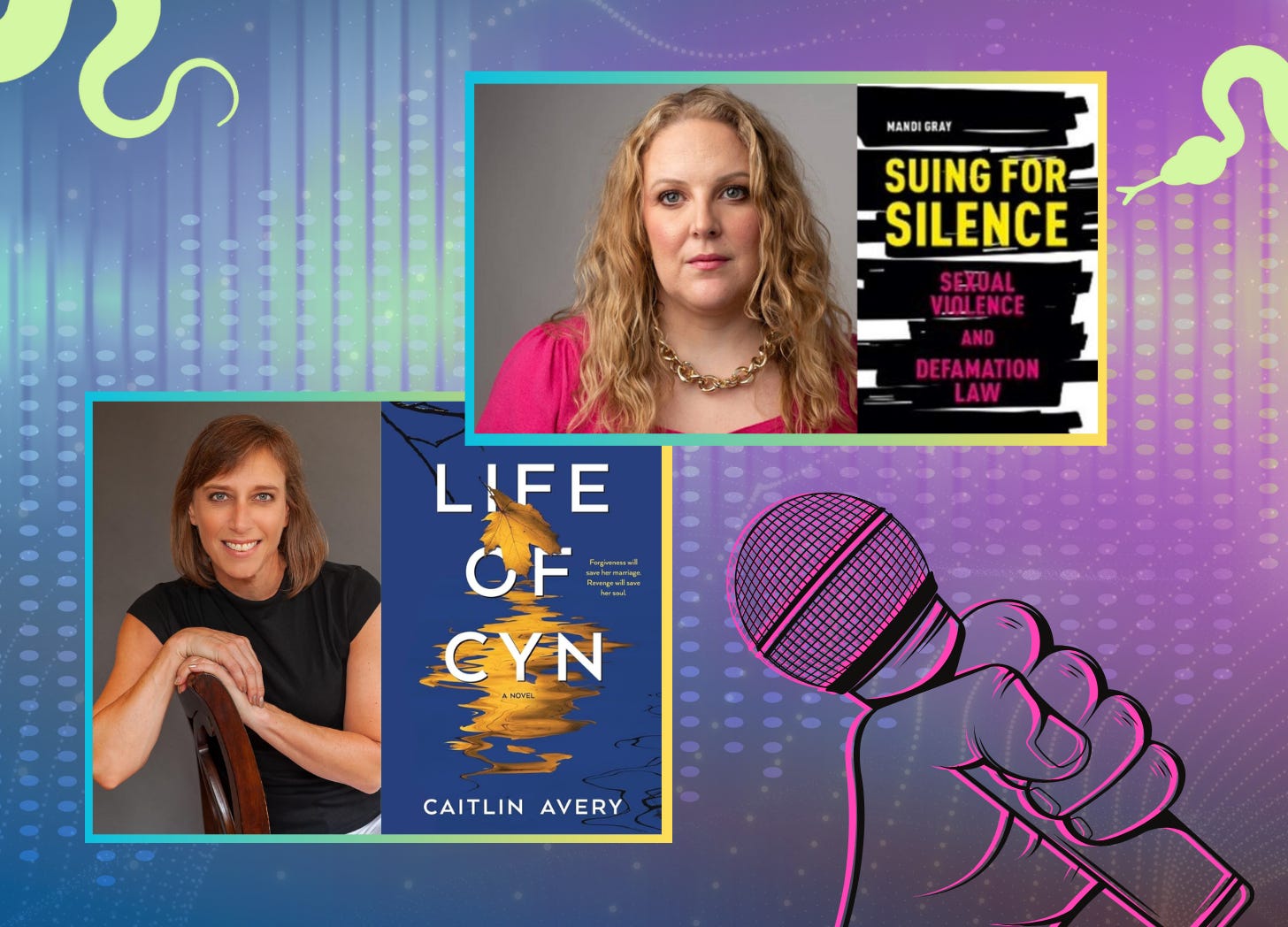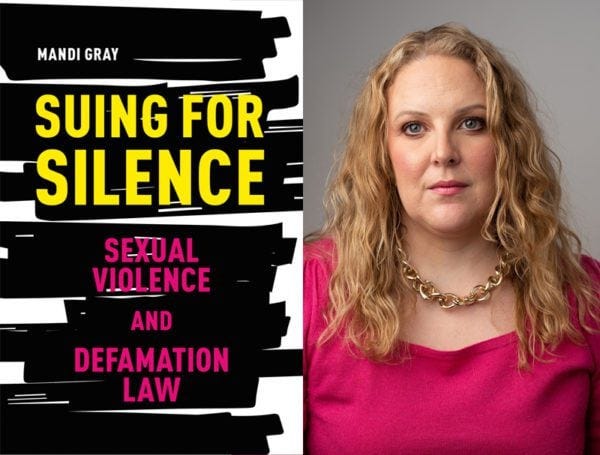Two Post #MeToo Books to Engage Your Rage
Plus news, interviews, and a free PR webinar for authors
Hello, today I’ve got a smattering of news, interviews, and events to share with you, plus two post #meToo era books I wanted to put on your radar, a novel called Life of Cyn, by Caitlin Avery, and the non-fiction book Suing for Silence: Sexual Violence and Defamation Law, by Mandi Gray. Both authors are members of my free weekly Writers’ Support Group which I co-host with author Lainey Cameron, but before we get into the books, I’d like to share the details of a new, free webinar our group is hosting tomorrow for authors, and an interview I did with the Rebel Writer’s Newsletter about my experience writing on Substack.
The Publicity Dilemma Webinar
For any published authors or aspiring authors out there, our Writers’ Support Group is hosting a free webinar tomorrow, Thursday the 7th at 7 pm EST on Zoom, featuring book publicist Lilian Sue, called The Pros and Cons of Hiring a Publicist.
Register for the free webinar here.
During the event, Lilian Sue and Lainey Cameron will sift through the pros and cons of hiring a publicist, how working with a book publicist can either waste all your money or maximize your time & energy, helping to achieve your goals. The webinar will explain how to ensure you find the best PR strategy for your budget, book, and needs.
I will be moderating the event Q&A.
*Even if you are in the Writers’ Support Group, you must register for the event, as it will use a different Zoom link.
Rebel Writers’ Interview
Also this week, I was interviewed by author Libby Copa for the Rebel Writer’s Newsletter. We spoke specifically about Substack and my experience writing on the platform.
Here is an excerpt from the interview titled Substack Mastery: Insights from Author Charlotte Dune.
I take a piece of advice to heart that I learned from Tim Ferriss: aim to engage 25% of your audience when you create content because reaching 100% is mostly impossible. So, I figure if I share four Substack posts a month, appealing to various 25% sectors of my readers, I eventually hit 100%.
I also try to write about topics that are of universal interest, though not always. For instance, one of my popular posts is about social media addiction. Another was a rant about shoe sizes. Another discussed my feelings regarding Hamas attacking Israel. These are issues almost all of us encounter. We all wear shoes. We all probably deal with some form of social media stress, and we likely all have feelings about the Israel/Palestine conflict.
That being said, I try not to be TOO controversial, not because I don't want to offend people, as you can't accurately predict that, but because I've noticed that when I'm feeling strongly or emotionally about an issue, it usually means that I'm not ready to write about it. I haven't fully understood the situation or the stakeholders on both sides. The fear of being offensive is often a call for deeper reflection.
Read the complete interview here.
Two Post #MeToo Books to Engage Your Rage
Now, I’d like to share two books with you that each engage the topic of sexual assault and violence against women in different ways. They remind us that the #metoo movement is far from over and should not be forgotten.
Life of Cyn
The first is Life of Cyn, a women’s fiction revenge novel by Caitlin Avery, inspired by her own experience as well as the experiences of other women who came forward and shared their stories with her after Avery exposed the facts and the man involved in her own sexual assault at age 17.
This review from Goodreads sums up the novel’s impact on its many readers.
"This was an incredible journey, and no amount of words will do this book justice. All I can say is read it."
I’ll let Caitlin do her own talking to say more about the book and why she wrote it, and why she decided to publicly shame her rapist on social media.
Watch our interview below, or listen to the audio version here or wherever you get your podcasts.
I applaud her for being this brave, because I certainly wouldn’t be.
And there are many reasons why I’d be scared to come forward to report sexual assault, even post #meToo, which was supposed to fix everything.
One of these reasons is legal retaliation, the subject of the next book I’m bringing to your attention: Suing for Silence: Sexual Violence and Defamation Law, by Dr. Mandi Gray.
Suing for Silence
During her graduate sociology studies in Toronto, Canada, Mandi Gray, the author of Suing for Silence, was raped by a male student. After reporting the sexual assault to the police, and waving her right to anonymity in the case, Gray found herself in the limelight as a public activist and champion of women’s rights. The criminal case against her assailant made big news and reached a precedent-setting verdict.
However, Gray didn’t realize this wouldn’t be her last tangle with the judicial system.
Shortly after the criminal trial concluded, she tweeted in support of another Canadian woman who’d reported a university-related rape. Tweeting in support of women survivors of sexual assault was not an uncommon thing for any woman to do during the #MeToo movement, which was taking place at the same time, and especially not uncommon for an outspoken activist like Gray.
However, the accused in this case was the celebrity professor and well-known Canadian writer, Steven Galloway, and he decided to retaliate, not just against the student alleging that he assaulted her, but against everyone who had publicly supported her online, including Mandi Gray, now Dr. Mandi Gray. He sued her and 20 other people for defamation.
Thus began Gray’s shift to researching how the civil legal system is abused by men to punish women who report sexual assault, which is the subject of her new book. These cases are also known as “Liar Lawsuits.”
In Suing for Silence, Gray weaves through media narratives, courtroom dramas, and the raw, unfiltered stories of those who've dared to report sexual assault and been sued for it. What emerges is a stark revelation: the architecture of defamation law can be twisted like a tourniquet to protect men's reputations, amputating women's ability to find justice after sexual assaults. The book cuts through the legal jargon, exposing these so-called liar lawsuits for what they truly are—Strategic Lawsuits against Public Participation (SLAPPs), a sinister tactic designed to quash dissent, and bleed female victims dry, financially and emotionally.
It's a chilling abuse of the legal system that not only aims to silence the individual, but that also imprints a deep mark on society at large, instilling fear in others who might contemplate stepping forward.
Through Gray's expert voice, we're led into a discussion that's as much about gendered power dynamics as it is about legal battles, urging a reckoning with how the law is wielded as a weapon of intimidation and financial ruin at the expense of the unaware tax payer.
While the book is more academic and dense than my usual picks, it’s an important read for all.
Not to mention that Gray had to select her words carefully in order to even write this book
Read Suing for Silence
Need more, the Documentary Film on Mandi Gray’s case
In addition to Gray’s book, the film, Slut or Nut: The Diary of a Rape Trial, chronicles her public sexual assault trial.
Last night I joined Dr. Gray virtually at the University of Alberta to introduce the feature-length documentary film, which we worked on together in 2018, and which takes the viewer on a first-person POV journey through Gray’s entire experience, from reporting the sexual assault to the police, to later testifying in court, as well as her activism around sexual assault and the “We Believe Survivors” movement in Canada.
Here is the trailer:
The organizers of the screening last night even made these amazing cookies!
While the event was only open to university students, you can watch the film on Amazon Prime under the title Diary of a Rape Trial. Or rent it on Google Play, Apple TV, etc.
Learn more and watch Slut or Nut: The Diary of a Rape Trial.
Now You
I imagine some folks unsubscribed as soon as they saw the word #MeToo, but if you’re still here and reading, thank you!
What was your favorite part of the #MeToo movement, and how do you feel about it now?
If these works interest you, please share this post with your community.
Unfortunately, we have a long way to go in protecting women, children, and even men from sexual assault.
Thanks for reading.
XXXOOO
Charlotte Dune







So happy to have lived through both and a longer slower antiracism journey. I always think of Metoo as a second wave because there was an earlier wave of sexual abuse in the workplace awareness where all the classes came from everyone had to take at work. I don’t remember if that had a name. It was in the nineties. It really amazes me how it was a big deal but later by the time you get to Metoo, you find out there was still so much of it going on.
Third comment from another perspective; If you paid attention as the #metoo movement blossomed and rolled forth, its whole dynamic was millions of women saying, “That happened to me too”. It was a mass confession and testimony of pain experienced and a lament with hope things might finally change.
And things began to change. Predatory men who’d hid behind power structures had their power ripped away and their crimes exposed and we as a society awoke from a slumber to a rude reckoning. It was a massive upheaval of goodness over badness. A dawning awareness of so many hidden terrible acts and the selfish blind attitudes that empowered them. If during that time you were not listening and learning and rejoicing in new found freedoms from oppression and hopes for ending daily suffering then you are just a shitbag who somehow hasn’t become aware of or compassionate toward others lives around you…and so notably wrongheaded given the loud passionate volume of all the voices rising in lament and testimony. The old statement “Get a life” applies as your life is wanting.
The major point that so many on any social issue where a group is suffering oppression seem to fail so consistently —listen when people talk and their words say they are being hurt. Listen. Groups of people don’t make these things up, they are real and we must respond and stop what’s happening just as you would if a human fell in the water and started screaming they’re drowning.
Listen and believe. So simple. Run and jump in the pond. Yet so many want to snarkly comment that drowning person sure is annoyingly loud with all the screaming. Jeez could you drown somewhere else next time.
But those are a little bit cartoonish representations. What’s really usually happening is your groups social media voices or public leadership voices (pastors, bosses) are wanting to somehow gain more clout/power/money by trashing another group and getting you to follow them and so they lambast the crybabies who want to criticize our perfect country and you happily follow.